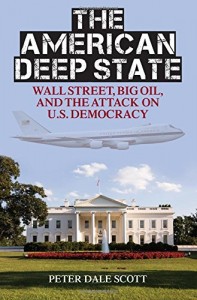
Peter Dale Scott
5 Star Connecting the Dots
By The Peripatetic Reader on December 13, 2014
Peter Dale Scott has written many books about the Deep State at work in the U.S. government. Scott depicts American society as structurally and inherently schizophrenic. Just as there is the public government and the deep government, and ordinary events and deep events, there are two dominant forces permeating United States history: One egalitarian, believing in fairness, inclusion, and free expression, and the other militaristic and exclusionary, which is only interested in social control.
According to his thesis, there are two levels of government, one the government the public is familiar with, with a Senate, House of Representatives, a President, which enact laws. The other government operates on a deeper level — thus, the “Deep” State — and consists of the national security apparatus, armed forces, and intelligence agencies. The thesis in Scott’s present book is the glue that binds these desperate forces together — many times in a symbiotic manner — are the monied elements in Wall Street and their interests for acquisition of global resources (oil, etc.), often working with other major capitalistic countries such as Saudi Arabia and Japan.
Of all of Scott’s books — any one of which are highly recommended — this present release is perhaps the most coherent, cohesive analysis of the different levels of governance at work in our society today. Scott examines the significant deep events — those “mysterious events” which involve some level of criminal conduct such as murder with the elements of the deep state — from the last fifty five years — such as the assassinations of JFK, MLK, RFK, Watergate, the October Surprise, Iran Contra, BCCI — and establishes a clear convergence between these events and the persons and interests involved in them, leading to the institutional and constitutional changes enacted after the occurrence of 9/11.
That monied, capitalistic interests drive American domestic and foreign policy is nothing new. And Peter Dale Scott is not some wide-eyed conspiracy sensationalist making hair-brained, half-baked, or screwball theories of deep events. What sets Scott’s book apart from similar books is that every assertion, every conclusion, every connection of persons, places and events are referenced, footnoted and fact-checked. Roughly one half of the book consists of endnotes, many of which themselves feature pertinent and important discussions augmenting the main text.
It all makes for compelling reading.




